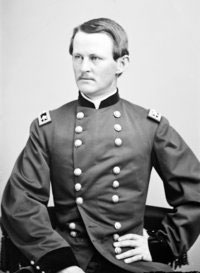 Civil War
Civil War
Wesley Merritt (1834-1910)
Wesley Merritt (June 16, 1834 - December 3, 1910) was a general in the U.S. Army during the American Civil War and the Spanish-American War. He is noted for distinguished service in the cavalry.
Early Life
Merritt was born in New York City. (Official records differ on his birth date; June 16, 1834 June 16, 1836, and June 10, 1837, have all been cited.) He graduated from the U.S. Military Academy in 1860 and was commissioned a second lieutenant in the 2nd U.S. Dragoons (heavy cavalry), serving initially in Utah under John Buford. He became the adjutant for the unit when it was renamed the 2nd U.S. Cavalry regiment.
 Civil War
Civil War
In 1862 Merritt was appointed captain in the U.S. Cavalry and served as an aide-de-camp to Brigadier General Philip St. George Cooke, who commanded the Cavalry Department of the Army of the Potomac. He served in the defenses of Washington, D.C., for the rest of 1862. In 1863 he was appointed adjutant for Major General George Stoneman and participated in Stoneman's Raid in the Battle of Chancellorsville in 1863.
In the Gettysburg Campaign, Merritt commanded the Reserve Brigade, 1st Division, Cavalry Corps of the Army of the Potomac. He was slightly wounded in the Battle of Brandy Station; soon after (June 29, 1863) he was appointed brigadier general of volunteers for his "gallant and meritorious service" at Brandy Station and Upperville. Being promoted directly from captain to brigadier general was an unusual step, even for the Civil War, but Merritt shared this honor on that date with Captains George Armstrong Custer and Elon J. Farnsworth.
In the initial cavalry actions of the Battle of Gettysburg, Merritt saw no action; his reserve brigade guarded the lines of communications of the Army of the Potomac. On July 3, 1863, however, he participated in the assault ordered by division commander Judson Kilpatrick on the Confederate right flank, following Pickett's Charge. His fellow general, Elon J. Farnsworth, was killed during this futile assault against infantry troops. Merritt took over the 1st Division of the Cavalry Corps following the death by typhoid fever of its commander, John Buford, in December, 1863. He commanded the division through Ulysses S. Grant's Overland Campaign in 1864. He received a brevet promotion to lieutenant colonel in the regular army for his actions at the Battle of Yellow Tavern, the engagement in which Confederate cavalry commander J.E.B. Stuart was killed.
During Philip Sheridan's Valley Campaigns of 1864, Merritt commanded the 1st Division, Cavalry Corps of the Army of the Shenandoah. Arriving at the opportune moment, his division routed the Confederate forces at the Third Battle of Winchester, for which he received a brevet promotion to major general. He was second-in-command to Sheridan during the Appomattox Campaign and was one of several commissioners for the surrender at Appomattox Court House. He was brevetted brigadier general in the Regular Army in March, 1865, for bravery at the Battle of Five Forks and the Appomattox Campaign.
Frontier Duty & West Point
After the war's end, Merritt continued to serve in the cavalry along the frontier. He was appointed a lieutenant colonel in the regular army and commanded the 9th Cavalry out of Fort Leavenworth. He served on the frontier until being appointed superintendent of West Point, a post he filled from 1882 to 1887. In 1887 he was appointed a brigadier general in the regular army.
Spanish-American War
After George Dewey defeated the Spanish navy at the Battle of Manila Bay in 1898, the U.S. began to organize ground forces to attack and capture the city of Manila. Merritt was placed in command of the U.S. VIII Corps being raised in California. In June, 1898, Merritt and the last of the VIII Corps departed from San Francisco for the Philippines.
Once Merritt arrived on the island of Luzon he and Dewey made preparations for the attack on the city. The two intentionally kept Emilio Aguinaldo out of the plans for the attack, neither wanting Aguinaldo's Insurgents to have any control over the city. It is widely believed that Merritt and Dewey made arrangements with General Fermin Juadenes, commander of the Spanish garrison, to surrender the city to the U.S. only after putting up a token resistance. In any case the city fell on August 13 and Merritt became the military governor of Manila. He later advised the U.S. in the peace negotiations at the Treaty of Paris. He was promoted to major general in the U.S. Army in 1895.
Merritt retired from the Army in 1900 and died ten years later in Natural Bridge, Virginia. He is buried in Arlington National Cemetery.